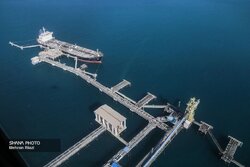
Iran’s oil production capacity to reach 4.038m bpd

According to Hormoz Qalavand, NIOC’s director of oil and gas production supervision, every year NIOC prepares a comprehensive plan to determine the targets for oil production and recovery maintenance, and in the current year the company has set it on the agenda to increase the country’s daily oil output capacity to 4.038 million.
In order to provide the requirements and conditions to achieve the mentioned goal, numerous technical, expert and management meetings have been held between NIOC and its subsidiary companies, Qalavand said.
“In addition to the detailed review of the plans, financial aspects of the programs have also been discussed in these meetings and an operational plan is formed in accordance with the country’s current economic conditions. The plan is now ready to be approved by the NIOC board of directors,” Qalavand added.
According to the official, the most important data-x-items needed for achieving the targeted production capacity are drilling rigs, core tubes and the equipment needed for drilling new wells and repairing and restoration of existing wells.
Modifying or replacing the coating of transmission pipelines, overhauling exploitation, desalination, and pressure boosting units, as well as repairing or replacing existing turbo-compressors are also among the measures that are needed to be taken to reach the targeted capacity, Qalavand said.
Back in July, Qalavand said that NIOC was ready to return to the maximum level of oil production.
“This would be rapidly done if the country needs to increase export, or domestic refineries need more feed”, Qalavand stressed.
In early April, Oil Minister Javad Oji said that the country’s crude oil production has reached the pre-sanction level.
Saying that the current capacity of Iran’s oil production has reached more than 3.8 million bpd, the minister said, “We hope that through the efforts of all those active in this sector, we will reach higher figures in the exports of crude oil, gas condensate, oil products, and petrochemicals in [the current Iranian calendar year] 1400 (started on March 21)”.
“By taking effective measures in onshore and offshore oil fields, drilling new wells, repairing wells, rebuilding and modernizing facilities, and oil collection centers, the current oil production capacity has reached before the sanctions, and we have no problem in performance and this amount of production”, Oji added.
Source: Tehran Times


Gold price edges up as market awaits Fed minutes, Powell speech

Glencore trader who led ill-fated battery recycling push to exit

Emirates Global Aluminium unit to exit Guinea after mine seized

UBS lifts 2026 gold forecasts on US macro risks

Iron ore price dips on China blast furnace cuts, US trade restrictions

Roshel, Swebor partner to produce ballistic-grade steel in Canada

EverMetal launches US-based critical metals recycling platform

US hikes steel, aluminum tariffs on imported wind turbines, cranes, railcars

Afghanistan says China seeks its participation in Belt and Road Initiative

First Quantum drops plan to sell stakes in Zambia copper mines

Ivanhoe advances Kamoa dewatering plan, plans forecasts

Texas factory gives Chinese copper firm an edge in tariff war

Pan American locks in $2.1B takeover of MAG Silver

Iron ore prices hit one-week high after fatal incident halts Rio Tinto’s Simandou project

US adds copper, potash, silicon in critical minerals list shake-up

Barrick’s Reko Diq in line for $410M ADB backing

Gold price gains 1% as Powell gives dovish signal

Electra converts debt, launches $30M raise to jumpstart stalled cobalt refinery

Gold boom drives rising costs for Aussie producers

First Quantum drops plan to sell stakes in Zambia copper mines

Ivanhoe advances Kamoa dewatering plan, plans forecasts

Texas factory gives Chinese copper firm an edge in tariff war

Pan American locks in $2.1B takeover of MAG Silver

Iron ore prices hit one-week high after fatal incident halts Rio Tinto’s Simandou project

US adds copper, potash, silicon in critical minerals list shake-up

Barrick’s Reko Diq in line for $410M ADB backing

Gold price gains 1% as Powell gives dovish signal

Electra converts debt, launches $30M raise to jumpstart stalled cobalt refinery

















